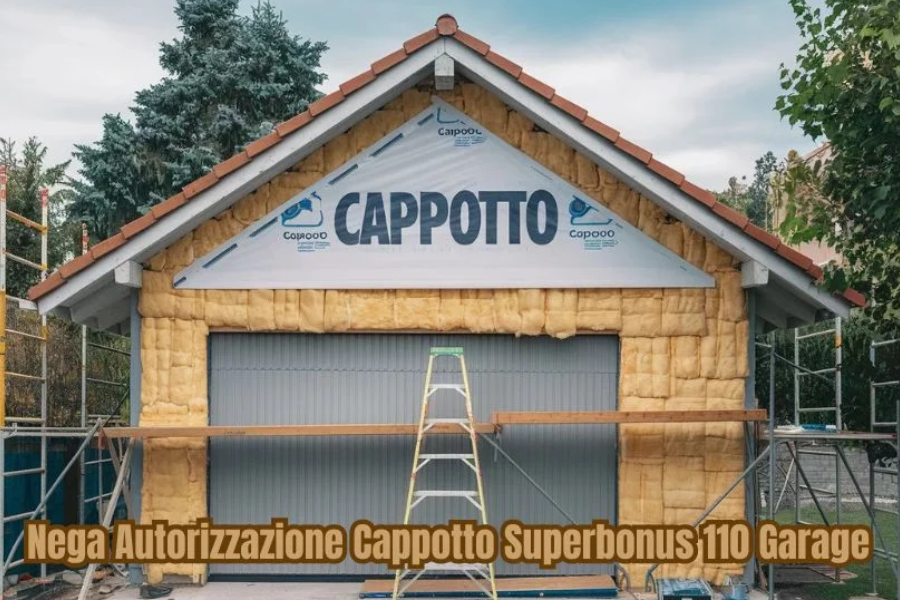Autorizzazione Cappotto Super Bonus 110 Garage : A Comprehensive Guide”
The Italian government’s Super Bonus 110% program is designed to promote energy efficiency and improve residential buildings through various upgrades. One key feature of the program is the installation of thermal insulation systems, popularly known as “cappotto.” However, the application of these upgrades, especially to spaces like garages, is subject to specific rules and conditions. In some cases, property owners encounter challenges, including the refusal of authorization for garage-related thermal insulation under the Super Bonus scheme. This article delves into the complexities of why requests for “nega autorizzazione cappotto super bonus 110 garage” — or denials of authorization for insulating garages — may occur, highlighting the program’s conditions and the implications for homeowners.
Understanding “Cappotto” (Thermal Insulation)
The term cappotto, or thermal insulation, is central to the goals of Italy’s Super Bonus 110% initiative. It involves the installation of external insulation systems on buildings to enhance energy efficiency. In practical terms, this means applying advanced insulating materials to walls and roofs to minimize heat loss, which can lead to significant reductions in energy costs and a smaller environmental footprint. Despite its benefits, implementing insulation in certain areas, such as garages, often presents challenges. Homeowners sometimes face the issue of “Nega Autorizzazione Cappotto Super Bonus 110 Garage,” where requests for garage insulation under the scheme are rejected due to regulatory or classification hurdles.
Super Bonus 110%: Conditions And Eligibility

The Super Bonus 110% offers homeowners an unparalleled opportunity to receive substantial tax incentives for making energy efficiency upgrades to their properties. However, not all projects or buildings automatically qualify. To be eligible, renovations must adhere to stringent energy efficiency standards and demonstrate measurable improvements in the building’s energy classification. Each project requires a detailed assessment to confirm compliance with guidelines established by the Italian Ministry of Economic Development and ENEA (Italian National Agency for New Technologies, Energy, and Sustainable Economic Development).
While these standards are designed to ensure effective energy upgrades, garages often fall into a grey area. Securing approval for garage insulation can be especially difficult, resulting in what is often referred to as “Nega Autorizzazione Cappotto Super Bonus 110 Garage.” Understanding why garages may not meet the criteria is crucial for homeowners planning renovations.
Why Garage Insulation Is Often Denied Under Super Bonus 110%
Garages, classified as non-habitable spaces, frequently encounter regulatory barriers under energy efficiency programs. Unlike residential spaces, garages do not need to meet the same energy performance benchmarks. As a result, applications for insulation upgrades in these areas may be denied under the Super Bonus 110%. This is a common reason for the rejection of requests under the banner of “Nega Autorizzazione Cappotto Super Bonus 110 Garage.”
The exclusion of garages typically stems from their classification as ancillary spaces, not integral to the living areas of a building. Consequently, they do not qualify for incentives aimed at improving the energy performance of primary living spaces. Understanding these distinctions can help homeowners navigate the complexities of the Super Bonus 110% and plan their renovations more effectively.
The Role Of Authorization i=In Garage Renovations
Securing authorization for garage renovations under the Super Bonus 110% program is essential for ensuring eligibility for the associated tax incentives. This process acts as a checkpoint, confirming that the proposed renovations comply with the established guidelines and technical standards. Without proper authorization, homeowners risk losing access to the financial benefits offered by the Super Bonus 110%, making it a critical step in any renovation plan.
Risks Of Unauthorized Renovations
Proceeding with garage renovations without obtaining the necessary authorization can lead to several negative outcomes. Homeowners may be disqualified from receiving the tax deductions or credits that form the core of the Super Bonus 110% program. Additionally, unauthorized work could result in legal issues, fines, or other penalties. In some instances, authorities might even mandate the removal of unapproved upgrades, leading to further financial and logistical challenges.
Key Considerations For Securing Authorization
Several critical factors influence whether a garage renovation project will receive authorization under the Super Bonus 110%. These include:
- Adherence to Building Regulations: The project must fully comply with local building codes and regulations to qualify.
- Energy Efficiency Requirements: The proposed upgrades should demonstrate a clear and measurable contribution to improving the building’s overall energy performance.
- Complete Documentation: Applicants must provide comprehensive documentation, including detailed technical reports, invoices, and receipts, to support their renovation claims.
- Certified Oversight: Depending on the scope of the project, professional certification or supervision may be required to verify that the work meets the program’s standards.
By addressing these factors and ensuring all requirements are met, homeowners can significantly improve their chances of obtaining the necessary authorization and unlocking the full potential of the Super Bonus 110%. Taking a careful, informed approach not only increases the likelihood of approval but also ensures compliance with all relevant regulations, protecting homeowners from future complications.
Impact Of Denied Authorization For Garage Insulation

Encountering a “Nega Autorizzazione Cappotto Super Bonus 110 Garage” decision can lead to considerable financial and practical setbacks for homeowners. Without access to the Super Bonus 110%, the opportunity to benefit from significant tax rebates for energy-efficient upgrades is lost. Additionally, failing to insulate a garage effectively can reduce the overall energy efficiency of the property, potentially resulting in higher utility bills and a less eco-friendly home.
Despite the disappointment of a denial, homeowners can explore other avenues for insulating their garages. Local initiatives or alternative energy-saving programs might provide financial support or incentives to complete the project without relying on the Super Bonus 110%.
Addressing Denials: Alternative Strategies And Solutions
If your application for garage insulation under the Super Bonus 110% is denied, there are still practical steps you can take to move forward:
- Investigate Alternative Insulation Methods
Consider insulation options that don’t require approval under the Super Bonus scheme. For example, internal insulation or alternative materials can still enhance your garage’s thermal efficiency, making it more energy-efficient without needing specific program authorization. - Reapply After Addressing Issues
If the denial was due to minor noncompliance or missing documentation, you may be able to rectify these issues and submit a new application. Consulting with professionals experienced in the Super Bonus application process can help ensure all requirements are met and improve your chances of approval on subsequent attempts. - Seek Other Funding Programs
Beyond the Super Bonus 110%, other funding opportunities may be available to support your energy-efficiency upgrades. Local governments, energy-efficiency organizations, or regional programs may offer financial assistance or incentives to help homeowners complete their garage insulation projects.
By exploring these alternatives, homeowners can still achieve their insulation goals while improving their property’s energy performance, even without the Super Bonus 110% incentives. Taking a proactive and informed approach can help mitigate the impact of a denied authorization and open doors to new opportunities for energy-efficient renovations.
The Role Of Local Authorities In The Approval Process

In today’s environmentally conscious world, prioritizing eco-friendly solutions is more important than ever. Local authorities play a pivotal role in the approval process for projects like garage insulation under the Super Bonus 110% program. Building a cooperative relationship with these authorities and understanding their expectations can be instrumental in preventing issues such as the denial of authorization, commonly referred to as “nega autorizzazione cappotto super bonus 110 garage.”
Local authorities assess whether projects meet the legal and technical requirements set forth by energy efficiency initiatives. By actively engaging with them, addressing their concerns, and demonstrating the environmental and energy-saving benefits of your project, you can improve your chances of obtaining approval.
The Importance Of Energy Performance Certificates (EPCs)
A comprehensive Energy Performance Certificate (EPC) is a cornerstone of your application. This document evaluates your building’s energy efficiency and provides measurable data on how proposed improvements, such as garage insulation, will impact overall performance.
An EPC serves as concrete evidence of a property’s energy rating and demonstrates the potential benefits of the renovation. Including this certificate in your application strengthens your case by clearly aligning your project with the Super Bonus 110% program’s energy-saving objectives.
Detailed Project Plans: A Key To Success
A well-structured and detailed project plan is critical to a successful application. Your plan should outline every aspect of the insulation project, including:
- The materials to be used and their energy efficiency ratings.
- A timeline for completing the work.
- An explanation of how the project complies with relevant building codes and energy regulations.
- Anticipated energy savings post-insulation.
Such a detailed plan demonstrates your commitment to meeting program requirements and helps address potential concerns from reviewing authorities.
Proof Of Ownership: An Essential Step
While seemingly straightforward, providing proof of property ownership is a fundamental part of the application process. Ensure that all ownership documents are current and accurately reflect your property details. Missing or outdated documentation is a common reason for applications to be denied under “nega autorizzazione cappotto super bonus 110 garage.” Preparing these documents in advance can help prevent unnecessary delays or rejections.
Financial Planning: Maximizing The Super Bonus 110%
Understanding the financial framework of the Super Bonus 110% program is crucial for project planning. Homeowners should calculate the costs of insulation, potential tax deductions, and long-term energy savings. This financial foresight not only helps in budgeting but also strengthens your application by demonstrating a clear understanding of the program’s economic benefits.
Highlighting Environmental Impact In Your Application
Garage insulation offers significant environmental benefits, from reducing energy consumption to lowering greenhouse gas emissions. Emphasizing these advantages in your application can enhance your project’s appeal to decision-makers. Highlight how the insulation aligns with broader sustainability goals and contributes to reducing the carbon footprint of the property. This approach can make your application more compelling and mitigate the risk of denial.
Overcoming “Nega Autorizzazione Cappotto Super Bonus 110 Garage”
Facing a denial doesn’t mean the end of your plans for energy-efficient garage insulation. By focusing on key aspects like engaging with local authorities, preparing comprehensive documentation, and emphasizing the environmental and financial benefits of your project, you can enhance your chances of securing approval. In cases where approval remains elusive, exploring alternative funding options or insulation methods can still allow you to achieve your energy efficiency goals without the Super Bonus 110%.
By taking a proactive and thorough approach to the application process, homeowners can navigate potential challenges effectively and make meaningful contributions to a greener future.
Comprehensive Guide to Navigating the Authorization Process for Garage Renovations

Successfully obtaining authorization for garage renovations under the Superbonus 110 program requires careful planning and adherence to a structured process. This guide provides step-by-step instructions to help homeowners navigate the process efficiently and maximize their chances of approval.
Step 1: Prepare and Plan Thoroughly
Before initiating the authorization process, outline the specific improvements you aim to make to your garage. Ensure that your renovation plans align with the Superbonus 110 program’s energy efficiency requirements. Key preparatory actions include:
- Documentation Collection: Assemble all necessary documents, such as energy performance certificates (EPCs), building permits, technical reports, and cost estimates.
- Professional Consultation: Engage with experts like architects, engineers, or energy efficiency consultants. Their insights can help ensure your plans are compliant with regulations.
- Budgeting: Account for all potential costs, including materials, labor, and administrative fees.
Step 2: Submit a Detailed Application
Once your plans are ready, complete the application for authorization. This typically involves:
- Obtaining Application Forms: Access the necessary forms from the appropriate government agency or online platform.
- Providing Supporting Documents: Include all required documentation, such as project plans, ownership proof, and invoices.
- Ensuring Accuracy: Double-check your application to eliminate errors or omissions that could cause delays.
Step 3: Await Review and Respond to Requests
The reviewing authorities will evaluate your application to verify compliance with the Superbonus 110 criteria. Be prepared for this process by:
- Remaining Patient: Reviews may take several weeks or months.
- Being Responsive: If authorities request additional information or clarification, provide it promptly to avoid setbacks.
Step 4: Receive the Decision
After the review, you will be informed of the outcome. Possible scenarios include:
- Approval: If granted, you can proceed with your renovations and claim the associated tax benefits.
- Denial: Should your application be rejected, review the reasons provided and consider reapplying after addressing any issues or filing an appeal if appropriate.
Practical Tips For A Smooth Authorization Process
- Stay Organized: Maintain a detailed record of all documents, communications, and submissions.
- Communicate Clearly: Reach out to authorities or professionals if you encounter challenges or need clarification.
- Plan Ahead: Allow sufficient time for reviews and potential delays in the process.
By adopting these strategies, homeowners can confidently navigate the authorization process and unlock the financial benefits of the Superbonus 110 program.
Addressing Common Challenges And Implementing Solutions

Despite its structured nature, the authorization process can present obstacles. Understanding these challenges and applying practical solutions can significantly enhance the likelihood of success.
Challenge 1: Meeting Energy Efficiency Standards
Achieving the energy-saving goals required by the Superbonus 110 may necessitate advanced planning and high-quality materials. To address this:
- Use certified, eco-friendly insulation products and technologies.
- Consult with energy specialists for tailored solutions to maximize efficiency.
Challenge 2: Navigating Bureaucratic Procedures
The multi-step nature of the authorization process can feel overwhelming. Streamline the experience by:
- Keeping an organized timeline of tasks and submissions.
- Collaborating with professionals familiar with administrative requirements.
Challenge 3: Managing Financial Constraints
Renovations often come with unexpected costs. Minimize financial stress by:
- Exploring government subsidies or financing options to cover additional expenses.
- Seeking expert advice to identify cost-effective materials and solutions.
Challenge 4: Addressing Authority Concerns
If authorities raise objections during the review process, take proactive steps:
- Provide detailed explanations or additional documents to resolve the issue.
- Consult legal or industry experts to advocate for your application effectively.
By preparing for potential hurdles and leveraging expert guidance, homeowners can successfully secure authorization and enjoy the financial and environmental advantages of the Superbonus 110.
FAQs On Authorization For Garage Renovations Under Superbonus 110
1. What is the Superbonus 110, and how does it apply to garage renovations?
The Superbonus 110 is an Italian government initiative that offers tax deductions for energy-efficient home improvements, including garage insulation. To qualify, renovations must meet specific energy-saving and compliance criteria.
2. What documents are required for the authorization process?
Key documents include energy performance certificates (EPCs), building permits, invoices, ownership proof, and detailed renovation plans. Additional documentation may be requested by the authorities.
3. How long does the authorization process take?
The duration varies depending on the complexity of the project and the efficiency of the reviewing authority. It typically takes several weeks to months.
4. Can I reapply if my authorization is denied?
Yes, if your application is rejected, you can address the identified issues and reapply. Alternatively, you may file an appeal if you believe the denial was unjustified.
5. What are the common reasons for application denial?
Common reasons include incomplete documentation, failure to meet energy efficiency requirements, or non-compliance with building regulations.
6. Are there alternatives to the Superbonus 110 if my application is denied?
Yes, local energy-efficiency programs or subsidies might offer financial assistance. Explore these options to continue your renovation plans without the Superbonus 110.
Conclusion
Obtaining authorization for garage renovations under the Superbonus 110 is a detailed process that requires careful planning, thorough documentation, and compliance with specific criteria. While challenges such as meeting energy efficiency standards or navigating bureaucratic procedures may arise, these can be overcome with proper preparation and expert guidance.
The benefits of authorization extend beyond financial incentives, contributing to increased property value and reduced energy costs. Even if your application is denied, alternative funding opportunities and solutions are available to help you achieve your renovation goals.
By understanding the process, addressing potential obstacles proactively, and adhering to the program’s guidelines, homeowners can maximize the advantages of the Superbonus 110 while improving their property’s energy efficiency and environmental impact.
Stay in touch with us for more updates and alerts! Usafullnews.co.uk




